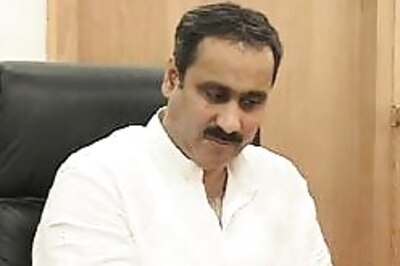
views
Tunis: In the cruise ship brochures, Tunisia is a land of endless sandy beaches, warm Mediterranean waters, ancient ruins and welcoming bazaars.
But behind the postcard-perfect facade, legions of jobless youths who see no future are seething under the iron-fisted leadership of President Zine El Abidine Ben Ali, and worried fathers wonder how they will feed their families. Their despair over Tunisia's soaring unemployment and rising food prices has fuelled more than three weeks of deadly riots, posing the most significant challenge yet to the 74-year-old leader who grabbed power 23 years ago in a bloodless coup.
And what has helped to break the barrier of fear that kept Tunisian anger bottled up for so long? Social networks like Facebook, which have helped organise protests and fuel online rage across this North African nation.
Police have fired repeatedly on protesters. The government says 23 people have died in the riots - 21 in the last three days - but unions and witnesses say at least 46 have died. In the town of Kasserine, site of the bloodiest confrontation, police were reported to have killed a man carrying the coffin of a child.
Riots were reported late Tuesday in the Ettadhamoun neighborhood five kilometers (three miles) west of Tunis - the first time the violence has reached so near the capital. A resident said youths set fire to a local administration building and sacked banks, while police fired on rioters. He spoke on condition of anonymity, because of the sensitivity of the unrest.
The revolt that began with an individual protest December 17 has left this moderate Muslim nation's reputation as a symbol of modernity in tatters and highlighted its inability to provide opportunities for its young.
"When a father can no longer feed his children, he loses his place ... and his dignity," said Selim Ben Hassen, the Paris-based president of the Byrsa citizens movement. "It's not just a question of money. It's a question of honour."
Ben Hassen credits Facebook for spreading word of the unrest - and bolstering timid citizens to break their traditional code of silence.
"The psychological barrier of fear has fallen," Ben Hassen said. "People now know it's possible to go into the streets, cry 'Freedom!' and say 'We don't want a president for life.'"
Video-sharing sites like YouTube and Daily Motion are banned in Tunisia, where newspapers are tightly censured, but Facebook abounds and videos posted there are quickly spread around.
One in 10 Tunisians has a Facebook account, according to Ben Hassen, whose movement is also on Facebook.
"It's a form of civil resistance," he said.
In the capital of Tunis, police violently broke up a demonstration Tuesday by about 100 actors, musicians and other artists that condemned the government crackdown on the rioters, Tunisian stage director Fadhel Jaibi told The Associated Press.
Jalila Baccar said she saw police attack fellow actress Raja Ben Ammar.
"(She was) insulted, beaten, knocked to the ground and dragged by her hair for a few hundred meters (yards)," Baccar said.
The unrest began after Mohamed Bouazizi, a 26-year-old with a university degree, set himself on fire when police in the central town of Sidi Bouzid confiscated the fruits and vegetables he was selling without a permit. He later died in a hospital near Tunis, and his desperate act touched a nerve with educated, unemployed youths nationwide.
Unemployment in Tunisia is officially around 14 percent but is much higher in rural areas and among youths.
The death even sparked several copycat suicides - in the latest, an unemployed 23-year-old climbed an electric pylon Tuesday near Bouazizi's hometown and electrocuted himself, union official Mohamed Fadhel told the AP.
The unrest has hopscotched to towns around the country, concentrated in, but not limited to, regions less visible to the waves of European tourists who flock to Tunisia's beaches. Public buildings, schools, cars and even police stations have been attacked.
Ben Ali, whose portrait hangs in public offices across the country, has labeled the rioting "terrorist acts" controlled from abroad. On Monday, he ordered all high schools and universities, seen as hotbeds of activism, to shut down indefinitely.
His government is now arresting bloggers and reporters. Paris-based Reporters Without Borders said a journalist for Radio Kalima was carted off Tuesday from his home in the city of Sfax and a correspondent for the radio in the southern city of Gabes was sprayed with a Mace-like gas, pushed into a truck and taken to the Interior Ministry.
Most of the deaths have been over the last three days in the central town of Kasserine, 120 miles (200 kilometers) southwest of Tunis.
"After trying in vain to stop (protesters) from invading police stations and firing warning shots, security forces were obliged to open fire," the Interior Ministry said statement Tuesday of violence there Monday.
Local teacher Chokri Hayouni said he counted 19 dead in the city, where he said 3,000 soldiers were deployed, including over a dozen military vehicles positioned around the central bank.
Youths in neighbouring Algeria took to the streets for four days to protest skyrocketing prices of staples like cooking oil and sugar, but authorities quickly slashed prices and calm returned. Experts see no particular link between the events.
France, the former colonial ruler, has laid low during the Tunisian unrest.
But the United States summoned Tunisia's ambassador, and US State Department spokesman PJ Crowley said Tunisians should enjoy the right to protest and expressed concern about a crackdown on the country's social media.
In response, Tunisia's Foreign Ministry summoned the US ambassador Monday, expressing "surprise" at the American reaction.
Germany's deputy Foreign Minister Werner Hoyer warned on Tuesday the unrest could affect Tunisia's rapprochement with the European Union.
The country vaunts its modernity. Tunisian women are banned from wearing Islamic head scarves in public buildings and have the right to initiate divorce. However, critics say that women are being used as window dressing in a country that fails to offer its citizens basic freedoms.
"The law will have the last word," Ben Ali told the nation in a televised address Monday. He insisted he is personally committed to creating 300,000 jobs in the next two years.
A former interior minister now in his fifth term, Ben Ali is suspected of wanting to replicate the man he ousted, president-for-life Habib Bourguiba, the founder of modern-day Tunisia.
Significantly, the offices of his ruling RCD party, which tightly controls political life, were among the buildings attacked by rioters.



















Comments
0 comment